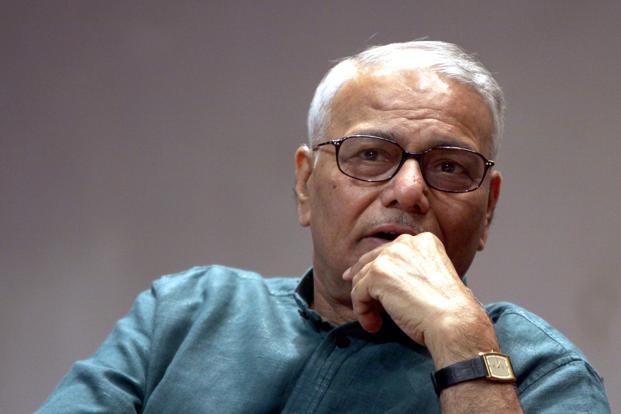
New Delhi: Unfazed by the government’s rebuttal of his criticism of Finance Minister Arun Jaitley on the state of the economy, including his Union minister son Jayant, BJP veteran leader Yashwant Sinha today stuck to his guns and hoped the Centre would do some course correction.
Sinha, who had yesterday launched a blistering attack on Jaitley that set off a political storm, said he had sought an appointment with Prime Minister Narendra Modi last year so he could flag the issues, which he did through an article in a national English daily, but got none.
“I found the doors were shut for me. Therefore, I had no option but to speak up (in media)…I am confident I have worthwhile suggestions to make (to the prime minister),” he told national TV channels.
Sinha said any government of the day “should listen” when people like former prime minister Manmohan Singh or ex-Union finance minister P Chidambaram, considered experts on financial matters, speak up, and advised against dismissing their views as “political rhetoric”.
The BJP leader, without naming the previous UPA government, said it “cannot be blamed” for the tardy implementation of central projects as the NDA has been in power for the last 40 months.
Replying to a question about whether his “disgruntlement” led him to criticise the government, Sinha hit back, saying it was the “cheapest accusation” that could be levelled against him. He insisted he “technically” continues to be a member of the BJP as the party has also not “thrown me out”.
Jayant Sinha, Minister of State for Civil Aviation, who made a stout defence of the government’s economic policies, got a lot of stick from his father.
Referring to his son’s defence of the government, seen as a counter to his criticism of the Centre’s handling of economy, Sinha sought to know why Jayant was shifted from the finance ministry “if he was so competent” to answer the concerns raised by him.
Jayant, who defended the government’s policies in an article in a leading English daily today, was shifted out of the finance ministry in July last year.
“There is a decline in the growth rate quarter after quarter. I decided to speak up when the problems in the economy were multiplying…I hope the government even now will take steps to correct the situation which has arisen,” he said.
Sinha said he did not flag the issues out of “personal rancour”.
He said the purpose behind highlighting the concerns about the economy through an article in another leading English daily was to bring certain issues in public domain so that the government does a course correction. Sinha said he did not expect his article to create “such a furore”.
Responding to Jayant’s criticism of his views, the 84- year-old IAS officer-turned-politician said that only the minister concerned or the government’s spokesperson should have commented on them.
“But if they (the government) thought he (Jayant) was very competent to reply to the points which I have raised, then my question is why was he shifted from the ministry of finance?” he asked.
Sinha said both he and his son were doing their “dharma” (duty). He insisted that the issue should not be seen as one between “father and son”.
“If someone has asked him (Jayant) to write the piece, then it is a cheap trick to play…I have not spoken to him (on the issue). Will do it some time to find out (what exactly happened),” Sinha said.
Sinha, who was finance minister in the first NDA government led by Atal Bihari Vajpayee, said policy paralysis and corruption resulted in projects not moving forward under the previous UPA dispensation.
With the BJP-led NDA returning to power over three years ago, he said, there was hope that the situation would improve.
“We did move forward (with the projects) to some extent.
But not at the desired pace. And we can’t blame the previous government for this after being in government for 40 months because we got complete opportunity,” he added.
Jayant, in an apparent reference to his father’s critical piece, said several articles have been written on the challenges facing the Indian economy.
“Unfortunately, these articles draw sweeping conclusions from a narrow set of facts, and quite simply miss the fundamental structural reforms that are transforming the economy,” he said.
“Moreover, one or two quarters of GDP growth and other macro data are quite inadequate to evaluate the long-term impact of the structural reforms underway,” he said.
Jayant also said these structural reforms were not just desirable, they were necessary to create a ‘New India’ and provide good jobs.


.jpeg)

